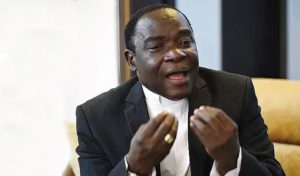 The Bishop of Sokoto Diocese, Mathew Hassan Kukah, voiced his concerns over the pervasive presence of the military in Nigeria, describing it as an “army of occupation” that stretches across all states and the capital city, Abuja.
The Bishop of Sokoto Diocese, Mathew Hassan Kukah, voiced his concerns over the pervasive presence of the military in Nigeria, describing it as an “army of occupation” that stretches across all states and the capital city, Abuja.
Kukah argued that such extensive military involvement undermines the essence of a civilian democracy. He referred to the remarks made by General Lucky Irabor, the immediate past Chief of Defence Staff, who highlighted the impact of this ubiquity on the military’s professionalism and integrity, leading to a phenomenon known as the “see finish” syndrome.
Kukah commended the recent pronouncement by Tinubu, where kidnappers would be treated as terrorists, but he urged the President to go a step further by setting a specific deadline to eradicate insurgency in the nation. The Bishop criticized the country’s political leadership, likening them to a drunken man stumbling and fumbling, and emphasized the need for a change in approach. Despite the current challenges faced by Nigeria, Kukah expressed optimism that better days lie ahead.
Drawing on the significance of Easter and the promises embedded in Christianity, Kukah called for unity and a robust plan from Tinubu’s government to foster national healing. He stressed the importance of inclusivity, transparency, and accountability in government policies, as well as the need for a clear communications strategy to inspire and establish timelines for achieving national goals.
Regarding the issue of insecurity, the cleric welcomed the President’s announcement that kidnapping and banditry would be treated as acts of terrorism. However, he emphasized the urgency of implementing a relentless and decisive plan with a specific timeline to bring these criminal activities to an end. Kukah also urged Tinubu to address the high cost of governance, prioritize food and physical security, and develop a comprehensive agricultural plan to restore dignity and honor to the nation.
In addition, Kukah called for a restructuring of the country’s security architecture, expressing concern over the allocation of large sums of money without tangible results. He emphasized the importance of maintaining the professionalism of the military and avoiding the recruitment of untrained and unprofessional groups, which could undermine their effectiveness. Kukah concluded by calling for an end to the blame game and urging collective efforts to defeat the criminals plaguing the nation.
